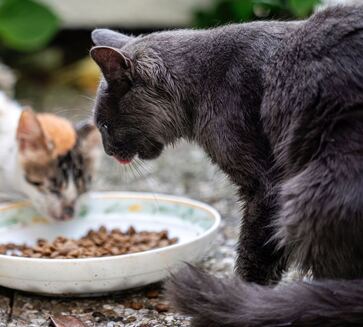- 120 HOURS OF RESEARCH
- 54 SOURCES USED
- 19 COMPANIES VETTED
- 3 FEATURES REVIEWED
- 9 TOP PICKS
What you need to know
Cat Food
- Choose cat food recipes without mystery meat and with a named animal protein as the first ingredient.
- A cat’s nutritional needs will depend on age, physical condition, and whether or not they’re pregnant.
- Choose cat foods with high levels of moisture, or complement kibble with water or broth.
- Be wary of packaging lingo. Terms like “Gourmet” and “Premium” might not mean anything.
INGREDIENTS & PROTEIN QUALITY
The first ingredient should always be a named meat and never a mystery meat or byproduct. Additionally, the first 10 ingredients shouldn’t have any of the ingredients suspected to cause dilated cardiomyopathy (DCM) by the Food and Drug Administration (FDA).
RECALLS & SAFETY
We scrutinized companies over their recall history and where and how they manufacture their products. While it didn’t automatically rule out a company, the less recalls, the better.
AAFCO CERTIFICATION & GUARANTEED ANALYSIS
Pet foods must follow AAFCO guidelines and be labeled as meeting nutritional levels–not as a supplemental meal. Additionally, the food must have a guaranteed analysis that breaks down its components.
OUR TOP PICKS: CAT FOOD REVIEWS
People love their pets like family, and this is no different in the feline community. As we researched the cat food industry, we stumbled upon many different opinions regarding the type of diet a cat should or shouldn’t have. Some argue that kibble is the perfect choice for any cat, while others believe that a homemade diet gives you the level of control you need to prepare the best food for your cat. To get to the bottom of the issue, we researched every type of cat food on the market and interviewed different experts to reach our own conclusions.
After more than 100 hours of research and studying over 50 sources, we’ve concluded that wet food is the overall best option for cats due to its high moisture levels and lower caloric content. Of course, all cats are different and most are picky eaters, so there will be cases where wet food isn’t the best option for your furry companion.
To cover as much as possible, we split our recommendations into two food types—wet and dry—and divided them into categories to target different needs, such as cats that require higher levels of moisture for their urinary health, or less calories, for weight management. We also added a third category, Best Meal Delivery Service, for cat parents who prefer ordering their feline meals by mail. The end result is a list of products that tackle different preferences and restrictions, including that of your average cat.
We wanted to add raw and freeze-dried options to our list, but our research led us to conclude that these options aren’t as safe as their wet and dry counterparts. Raw and freeze-dried foods consistently appear in recall lists for reasons such as bacterial contaminants like Salmonella.
As Dr. Bruce Gordon, associate director of the Cornell Feline Health Center explains, “We don’t believe raw food is a good idea, primarily because they can harbor pathogens, mostly bacterial pathogens, and also, in some cases, parasites. This is documented in the literature, where they’ve actually found cases where cats have gastrointestinal disease.”
The same applies to freeze-dried: it might look like a safer option since it’s dehydrated meat, but Dr. Gordon argues that “surprisingly, you would think that the freeze-drying process would eliminate bacteria and parasites from food if it’s raw, but that’s not necessarily the case.” We’d never recommend any food that would harm you or your pet, which is why we decided not to include those options.
Why We Didn’t Recommend Products for Cats with Allergies
Although there are plenty of limited ingredient diet recipes (L.I.D.) on the market for cats with food allergies and sensitive stomachs, it became increasingly hard for us to pinpoint a “best overall” choice. Since food allergies vary from cat to cat, no matter what product we recommended, chances were that your (or somebody else’s) cat might be allergic to it. Instead, we recommend that you visit your veterinarian to talk about your cat’s condition, so they can guide you on w your cat’s dietary choices, and the steps you can take to improve their health.
To read the in depth full report click here
Article submitted by Consumers Advocate
Photo credits Biel Morro on Unsplash and Hulki Okan Tabak on Unsplash



 RSS Feed
RSS Feed

